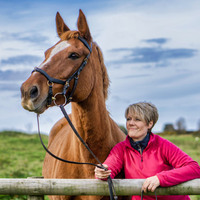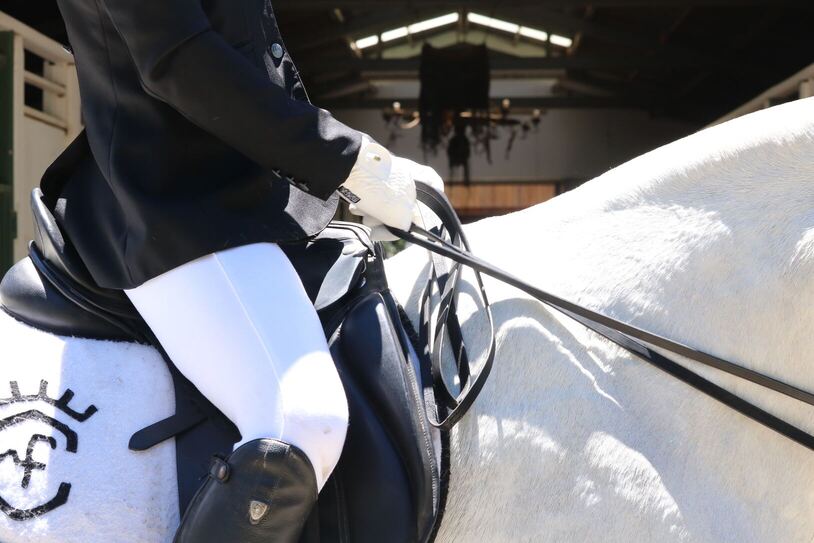Why do competitions cause so much anxiety for riders of all disciplines? In that case, why do we continue to compete? And how can we change our thinking to overcome the nerves?
I first came to NLP because these were the questions I was asking myself. Competing was the most nerve-wracking thing I did and far outweighed anything I did for my day job. I couldn’t quite understand my desire to do something that made me feel so bad, so long before I even left the yard!
Competitions spark an anxiety response in many riders. What’s happening in the mind for us to continue competing, whether we have nerves or not? It may be that ultimately, we are excited by the challenge and motivated to push ourselves out of our comfort zone. What’s happening in the mind for us to continue competing, whether we have nerves or not?
The mind works on a reward-expectation-punishment system. The reward gives us a showering of feel-good chemicals such as dopamine. For riders, this comes from a successful day or from the relief of having survived it! The dopamine hit is very strong, however, almost addictive and it persuades us to compete all over again.
Riders who set realistic expectations will also enjoy a dopamine surge when they think of meeting their expectation. If expectations aren’t met, or worse, the expectations were unrealistic, then the mind withdraws the dopamine and this is the punishment aspect. You don’t feel anywhere near as good as when the dopamine is coursing through your body.
However, the cycle will continue, because we’ll set an expectation again at some point, enjoy the thought of doing well and get out competing again and that gives us some more dopamine. Then we’re motivated to get out and compete again.
Tip: to stop the reward-expectation-punishment cycling around and around, set mini goals, break down your expectations. For instance, you may have a goal of having a calm horse, staying calm and in the moment yourself or nursing your horse around the show-jumps. When the expectation is lowered, you will feel far better when you achieve your mini goal than you will when you chase the ribbons.
Fight or flight
The instinctive fight-or-flight response is, however, an in-build device to help us out in a fearful situation. It’s our primary and automatic switch for helping us to avoid danger. It’s purely survival-driven and aims to keep us alive. I think it’s really important for riders to remember that this response is always there for us, to protect us and to help us out of danger.
Fear and anxiety on the other hand are secondary responses. They don’t protect us, in fact, they tend to hamper us. We often feel paralysed or that our aids are ineffective and the ability to think has left us too.
Fear and anxiety don’t give us an ‘edge’. I know that some riders say that they need the nerves to feel energised and pumped up. However, they are mistaking anxiety for excitement. It’s no wonder that some riders do that. Anxiety and excitement are the flipside of the same coin. They cause extremely similar changes in our bodies and mind.
The major difference is how the rider labels the feeling.
Tip: when you next feel anxious, whether you’re late for an appointment or about to go into the ring, say to yourself, “I’m excited.” This might seem an odd thing to do. Go with it. It’s very surprising how a change of wording can shift how we’re interpreting what’s happening around us.
Focus
It’s common to talk about controlling the controllables, but more difficult to do that in the competition atmosphere. Having a practised means of doing this makes it so much easier.
Tip: The bubble exercise – draw two circles, one inside the other. On the inside circle, write down all the things you can control and would like to focus on – breathing, posture, bending your horse – the key is not to have too many. In the outer circle, write down all the things that you can’t control and should defocus on – the weather, the judges, the people watching – you can make this list as large as you like.
Do the bubble exercise for your schooling, your lessons, your competing, changing the words for each one, learning to focus on 2-3 things and really placing your attention on those.

Tip: If you struggle with your focus being drawn to something particular at competitions, e.g., the flowers, the water tray, the by-standers etc., then try this mindfulness technique to limit the time and energy spend on those uncontrollables. When off the horse: talk to yourself! Inside your head, of course! Keep your mind occupied with trivia. Talk about the weather, how many strides from the office to your lorry/trailer, how big the puddles are, in fact a running commentary on everything you see and hear, apart from those things you are trying to defocus on. When on your horse: talk yourself around your competition as if your instructor were in the arena/on the course micro-coaching you round, telling you where to go and what to do with your hands, seat and legs.
As soon as you can after the competition, write down everything that went well; even if you feel disappointed, there will be positives. Write down your next steps for schooling – remember you can do this as a bubble exercise, avoid adding too much to your inner circle and overloading yourself. Keep your focus small to get your dopamine reward when you complete it.
Keeping a diary of your shows enables you to also make notes on how your schooling went before the next show. If there are still issues to deal with, you can set your expectations lower and allow your mind to feel good with a smaller goal.
Giving yourself unrealistic expectations and huge goals only sets you up for disappointment, frustration and that punishing withdrawal of dopamine!
If you continue to have competition nerves, you may want to learn a technique such as NLP (neurolinguistic programming) which helps to re-set your thinking and gives you powerful psychological techniques to use on and off the horse.



